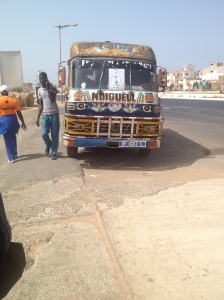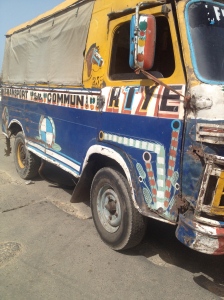In a recent TedTalk, Author Taiye Selasi attempts to tackle the complicated concept of identity. Her talk focuses on identities and location, entitled “Don’t ask where I’m from, ask where I’m a local.” She states: “Where I’m from comes from wherever I go” and when talking about returning to Ghana, she responds: “I go back to Ghana, but I can’t go back to Ghana. We can never go back to a place the same way we left it.”
I’m beginning my last week as a Fulbright ETA. But more than that, I will soon be heading home to a place I haven’t been since May of 2014…a time that feels like eons again, although it’s not so long ago in reality. I think it feels like eons because of everything I’ve experienced over the past year and half and all of my own personal growth and maturity. Needless to say, I’m bundled up in a mixture of emotions as I (mentally) prepare myself to return home. Yet, as Selasi describes, it’s our experiences that identify us. I am born an American, but my thought and mindset are influenced by other non-American experiences and interactions. I, too, feel like I can go home, but I can never really go home. Home, in this sense, being the open spaces of Duanesburg—the greenery, the lack of cars, the rolling hills.
And with these endless experiences that shape how we perceive who we are and the world around us, we also carry stories. For sure, my storybook is bursting from its binding as I continue my collection while also embarking on discovering mon avenir. As I wind down my ETA fellowship, I can’t help but mention only a few ‘stories.’
Back to school, back to school
And with that, summer time in Dakar has (almost) come to an end—though it’s only getting hotter. The majority of the private schools are back in action amidst the short break for Tabaski (more on that soon). I started teaching 7th grade English and a few other high school classes and have found myself to be loving it. Kids come from all over the world besides the U.S. and Senegal and have such a variety of backgrounds and experiences (even getting to speak a little Swahili with some Congolese students). It’s been fun getting into the content of the classes, getting to know the students, and adjusting to school life. Not to mention, the other teachers are wonderful and have welcomed me with open arms. I sat with the librarian, a former Peace Corps Volunteer, and shared photos and stories of my time in Uganda as she recounted stories from her early days in Senegal. For the most part, I speak French with the majority of the other teachers, though my AP English counterpart insists on speaking Wolof to me so I can get better (which is totally fine with me)!
The school has multiple sites within Dakar and I juggle my time at three of them. There’s even room to do mini workshops and presentations with other teachers where I hope to disseminate my ideas pertaining to reality pedagogy and how to integrate some of the concepts into the classroom. Slowly slowly.
Dafay sàcc
After school, I take the car-rapide home. 75 CFA (on most days) and a tight squeezed beautifully painted bus with baby shoes hanging from the ceiling for good luck and protection and I’m all set. Most days, especially during Ramadan, the rides are somewhat quiet and peaceful aside from the boy collecting transport money and passengers making sure they get the right change back. And during the short ride, I commence my ‘thoughts while moving’—a habit I had every day on the boda bodas in Uganda where I think about everything under the sun and get the most inspiration for writing, telling myself Oh I have to remember to write about that and then (typically) forgetting. One day last week, along one of the stops on the VDN, a woman raised her voice. She started speaking loud and fast and immediately, you could tell something was wrong. Then, another man got off and the rest of the car continued to yell things after him—insults I assume (haven’t covered those in my Wolof classes yet). I asked the man next to me what exactly happened. The man who got off was attempting to steal from the woman, ‘pick-pocketing,’ he said. The unsuccessful thief descended from the car, but the conversation had only just begun. One thing to note…this was Friday afternoon, right before the Friday prayer so folks were in a rush to get to the mosque. After, another man began recounting a story of a student he knew who had a similar situation happen to him. All eyes were on him as my typical commute turned into storytime session, something that doesn’t really happen so often. I almost missed my hop-off spot.
Tabaski
When the doorbell rang around 10 am on another calm and warm Saturday morning here in Dakar, I opened it to find my host dad just standing there. I asked if he needed help with something and he said: “Well, kind of. I have the sheep.”
Flash forward two weeks and two muttons later, I think I’ve eaten enough meat to satisfy my meat intake for the rest of my time here. Tabaski eve and morning consisted of a lot of prep, similar to Thanksgiving. The day before the holiday, I accompanied my host mom to the local market to get potatoes, garlic, onions and other essentials for the day. That night, we stayed up peeling the garlic and chopping the onions only to wake up the next morning and prepare prepare prepare. That same day (Tabaski eve), we had a bit of a mutton crisis. The second mutton that was brought home collapsed and was unable to stand up, clearly very sick and on the verge of dying. Sophie and I stared at it from inside. She told me: “Maybe it’s just pregnant.” I started cracking up while Sokhna, the maid, asked me what she said and I re-explained. We both started laughing, mostly at Sophie’s innocence—you could clearly tell the sheep was a male. Thus, we had two options: kill it now or bring it back to the seller. My host dad loaded up his car with the overly bloated sheep and an hour later, came back with a lively little guy. “Heureusement, ses yeux sont ouverts!” My host mom exclaimed as we took a peak at our new housemate.
During the morning hours of Tabaski, you could walk on the streets and find men with knives—ready to slaughter your muttons for you. And that is exactly what we did. My host mom found two men, brought them to the house, and within the hour, they had slaughtered, skinned, and left. About $30 later and two basins of meat, we were almost ready to eat. I gripped the meat as my host mom chopped it into smaller pieces as we divided some into bags for meat during the week, bags for neighbors (as is customary that you give pieces to neighbors/those who do not have a lot), and bags for family members. Meat on meat on meat. Hands covered in blood and meat slime, I couldn’t stop but think how incredible this moment was—to be here right now, to celebrate this holiday, to be a part of this wonderful family.
And boy did we eat. And boy was it delicious, to the point where I can’t look at the leftover meat in the fridge without feeling a little sick.
A brief note on eating…
Inviting others to eat with you is customary here. For breakfast, lunch, and dinner, if someone enters your place of eating, you must tell them to join you (i.e. kaay ndekki). The fact that this is even a part of the language tells a lot about culture here…I can’t think of anything in Swahili or Lusoga where you invite others to eat with you. Even in the U.S., we have our individual plates/preferences and sure, we may offer a bite of something to someone, but we could never say “Come breakfast/lunch/dinner with me.” The notion of sharing is something other cultures could learn a lot from. Sharing and giving to others. It’s beautiful.
Petit à petit
One of my favorite things will always be listening to Oumy. She has given me so much guidance about life, motherhood, and even marriage. Her recently married niece stopped over with her husband to present him to her belle-famille (in laws). After, Oumy was telling me about another niece who is about 32 and not married yet, probably because she is too “picky.” She told me of a story of a wedding party we all attended and how one of the servers was madly in love with her niece, but her niece gave him zero attention because he was a server. Oumy told me that’s not important. If you love someone, it doesn’t matter what he or she does. Maybe they can jump the ladder to something else, but it doesn’t mean you turn them down. You get to know the person, maybe you fall in love, and then you start your life together. Of course, it’s not as prescribed as it may seem as we all discover, one way or another, whom it is we decide to spend our life with. You do things little by little, “petit à petit” she tells me.
When I first arrived to Dakar, I imagined my time here would come and go and I’d move on. Clearly, my head was not in the right place as my initial idea of Senegal as a “pit stop” has completely transformed. I feel like my time in this part of the African continent is only beginning and I’m eager to improve my French (as that opens the door for more West African discovery) and get to a higher level of Wolof. Without a doubt, this continent is absolutely massive and the amount of peoples, cultures, traditions, languages are endless. Grateful is an understatement for how I feel each day here.

